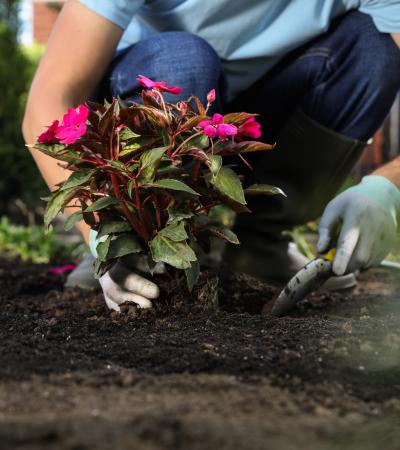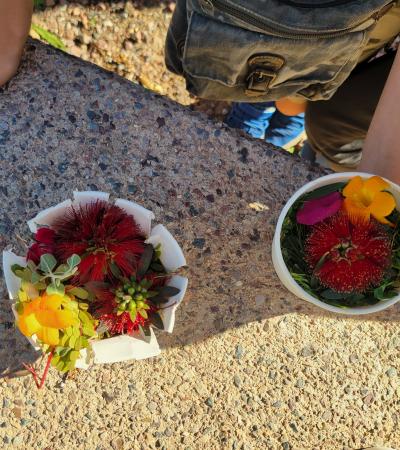You may recall those stories from the early days of the COVID-19 pandemic, where wild animals were reclaiming natural spaces typically dominated by humans. With people staying at home, wild animals found the confidence to venture beyond their usual habitats.
"I was captivated by these stories and wondered how parents could broach subjects like climate change with their children," reflects Martha Meyer of Evanston (Ill.) Public Library. Recognizing this as a unique opportunity for librarians to alleviate pressure on parents during an already stressful time, she envisioned a way to provide children with access to high-quality literature on sustainability and the natural world. Thus, the Blueberry Award was born.
The Blueberry Award, organized and administered by the Evanston Public Library, is the first of its kind annual literary award that honors children’s books that inspire a love of nature and action for planet Earth. Now in its third year, the 2023 winning titles were announced at a ceremony last month.
Programming Librarian spoke with Evanston Public Library’s Martha Meyer, Elizabeth (Betsy) Bird and Bridget Petrites on their favorite Blueberry books and programs for Earth Day and how libraries can help promote sustainability, inspire a love for nature, and reduce the rise of climate anxiety in kids.
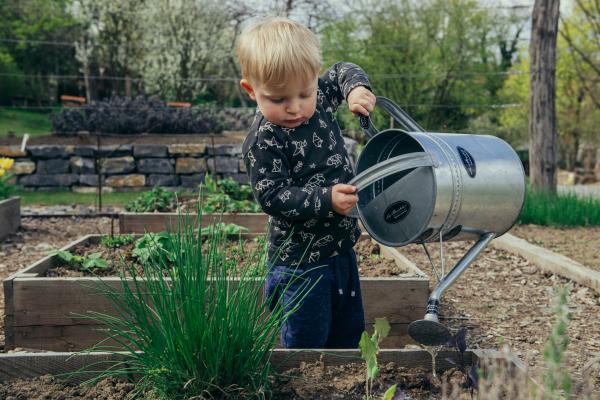
Inspire a love for nature without inciting fear
Blueberry-winning books don’t gloss over climate change; instead, they provide science-backed information and offer practical steps that children can take in their everyday lives. This empowers them rather than leaving them feeling paralyzed by climate anxiety and guilt.
While planning the first Blueberry Award, the team completed deep dives into recently published children’s nature books. “We got all the books we could get our hands on,” Meyer says, “and I saw so many terrible mistakes, not so much factual, but in terms of how we're talking about climate change with kids.”
Writing an excellent children's nature book is delicate. “When it comes to climate change in children’s literature, you have to understand the science, you have to understand the psychology,” Meyer says. The Blueberry Award committee follows criteria with acknowledgment of excellent writing and science and also a separate criteria for anti-climate anxiety.
A lot of children’s nature literature, though well-meaning, pushes a narrative of “it’s up to you to save the world!” Sometimes, authors themselves struggle to determine the most effective way to present information to their intended child audience, placing pressure on young readers.
“One of the big parts of the Blueberry Award is to inspire a love of nature but without doing so in a fearful manner,” says Petrites. “We ask, does this book bring joy? Does this book make kids want to get outside and explore?”
Many books read to kids around Earth Day, as well as general children’s literature about nature, often cover only the basics — emphasizing sentiments like "I love the Earth because it is my home," without going much beyond that.
“The books tell the kids, yes, you should love the Earth! But there’s not a why,” says Betsy Bird. “Books should show kids to love nature because it's fun. We get to look at birds, eclipses and cicadas coming out of the ground! If you love something, you are more inclined to want to protect it.”
Instead of books that tell the next generation it’s all up to them, tell children that it’s not up to them alone. “If you don't want kids to be anxious, make this a fascinating, cool group project you get to participate in,” Meyer says. “Some books are wonderful but end up with the sense that nature is a frightening place and that it’s easier to retreat into your phone.”
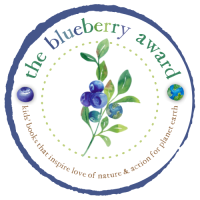
The books
The full list of winners of the Blueberry Award since 2021 can be found on the Blueberry Award homepage.
Winners of the 2023 Blueberry Award

"The Gift of Mnoomin / Mnoomin Maan’gowing"
By: Brittany Luby, illustrated by Joshua Mangeshig Pawis-Steckley, translated by Mary Ann Corbiere
Published: 2023
Blueberry Winner, Picture Book. A child holds a mnoomin seed and imagines all the life that made a single seed possible―Mayfly, Pike, Muskrat, Eagle and Moose. This bilingual story reveals the cultural and ecological importance of mnoomin, “wild rice,” a grain that's a keystone species of the Upper Great Lakes ecosystems.
Age Range: 3 - 7 years
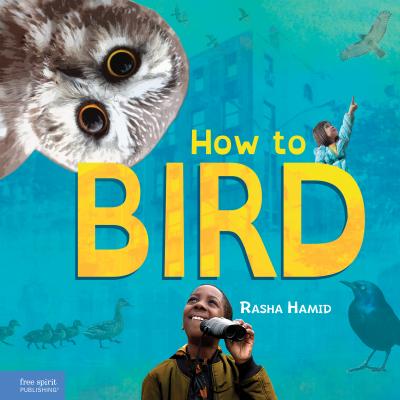
By: Rasha Hamid
Published: 2023
Blueberry Winner, Nonfiction Picture Book. “Are you a birder?” Good news. Anyone can bird! Let this joyful little book be your guide with vibrant photographs and a heaping helping of enthusiasm!
Age Range: 3 - 8 years
Earth Day and nature programs
There are many ways to get nature programs into any library type no matter the location or time of year. From simple story times to books that lead kids through art projects, the Blueberry Educator Resources provides books to inspire a variety of program types. These resources make it easy to plan excellent Earth Day and nature programs.
Book display
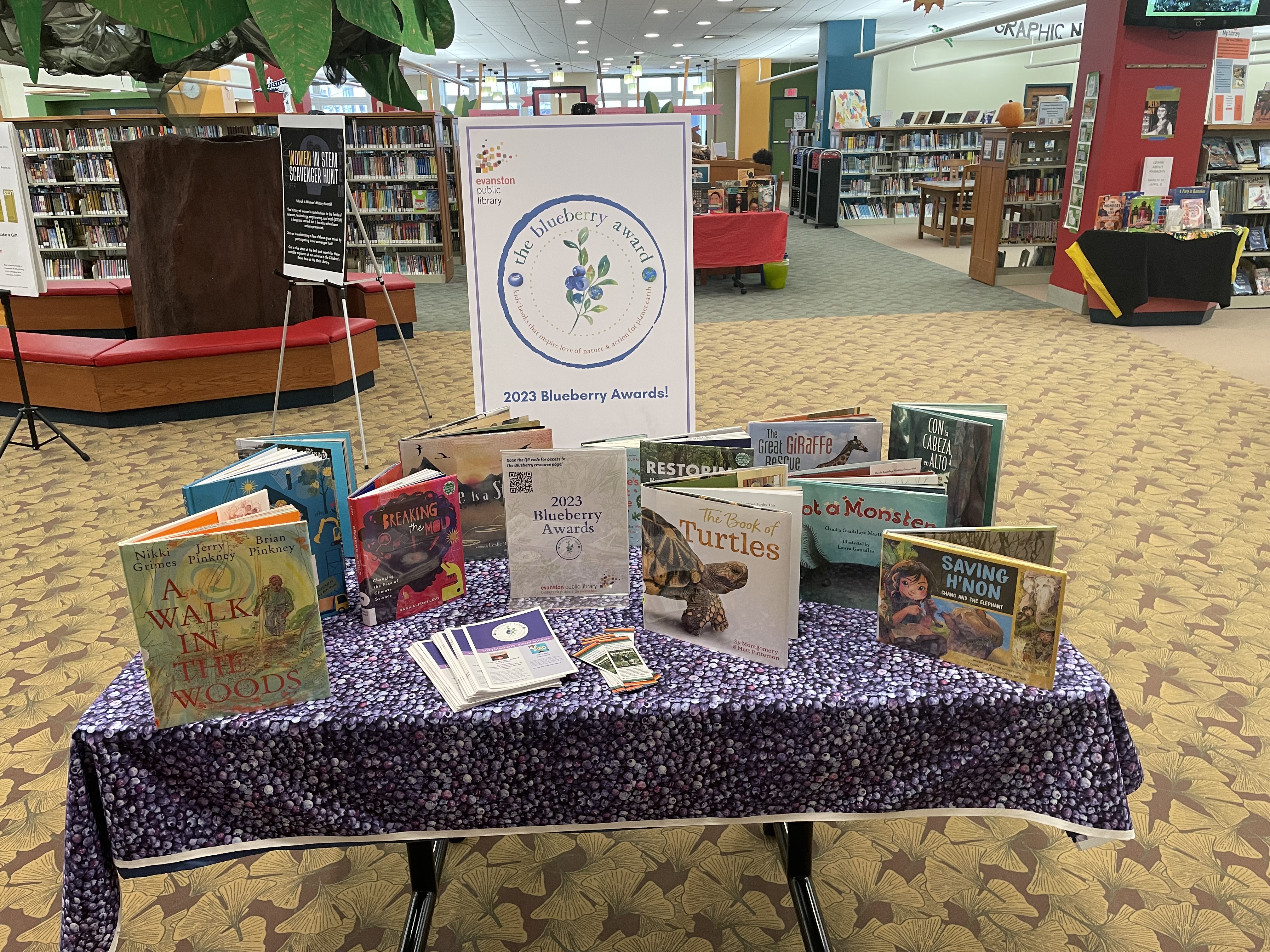
Create a book display of Blueberry books for Earth Month (or any time!). You can even print out the Blueberry Award flyers and the Blueberry Award spine label to add to the Blueberry books in your collection. For more resources, go to www.epl.org/blueberry.
Partner with local ecology centers, park districts, botanic gardens, arboretums, bird-watching groups
Getting involved in nature programming can lead to some exciting partnerships. If you haven’t already, try reaching out to local park districts and environmental groups for unique collaboration opportunities.
The Evanston Public Library has arranged story walks at the local ecology center and has also partnered with the center on outdoor programs. On National Fox Day, the ecology center planned a program around the first Blueberry Award winner “How to Find a Fox.” The outdoor program included a story hike teaching kids about the necessary skills to look for foxes in the wild and closed out with s’mores around a campfire.
The library has recently developed new relationships with a variety of groups around town, including gardening and birding groups and the local climate action group.
Simply inviting these groups to programs is a good way to start an introduction to future collaboration. “Inviting people makes them aware,” Meyer says. “Not just coming to them with an ask right away, but saying, 'We’re doing this program that I think your group will enjoy.’ See where it goes from there.”
Programs for urban and rural areas
Even in urban areas, nature programming can offer a range of activities, from rock collecting and indoor gardening programs to nature walks and beyond. Large cities also present excellent bird-watching opportunities.
Books on the Blueberry Award list reflect the diversity of the world and celebrate nature found in rural and urban landscapes.
“The goal of finding the right book and program should be about making nature accessible no matter who you are or where you live,” says Petrites. “Even if you’re not near a national park or have never been to a national park, there will be a book on the list that is applicable to you.”
2022 Blueberry Honor/Picture Book winner “Uncle John’s City Garden” is a great read-aloud for kids in cities or small towns.
Nature journals and nature art
Blueberry book “Chloe’s Nature Journal” and recommended educator resource “The Big Book of Nature Art” guide children in starting a nature journal and making beautiful works of art using natural and recycled materials.
Whether it’s for an Earth Day program or not, using award-winning, kid-approved resources helps to amplify library programs with credibility and creativity. It also takes a lot of the heavy lifting off you, the librarian, since many of the program planning ideas are already there in the books.

